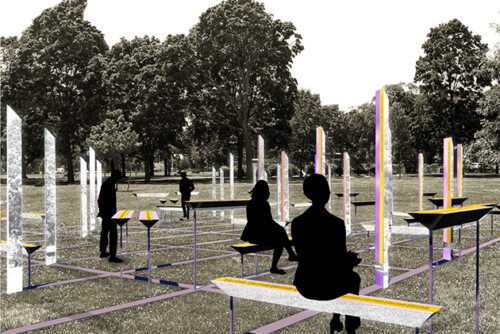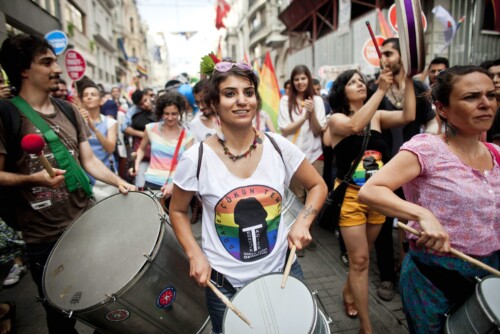Of the many changes the world has undergone in the last few decades, few have stirred more intense public anxiety and controversy than the phenomenon of global migration. With the exception of the global war against terrorism, to which it is often directly connected, the migration of people largely from the Global South into countries and cities of the Global North—in search of work, reprieve from violence and conflict, and new life possibilities—has provoked the most virulent forms of opposition, discrimination, and policing directed at immigrants, particularly in the liberal democracies of North America and Western Europe. In the U.S., aggressive state measures militarize the policing of the U.S.-Mexico border; federal agencies conduct terrorizing raids in homes and workplaces, arresting and detaining thousands of foreign-born citizens who languish in prison without formal charges for indefinite periods; and citizen organizations target recent immigrants for the degradation of their communities’ “quality of life,” (a rash of practices that a NY Times editorial recently decried as “The Great Immigration Panic”). 1 Meanwhile, the French state deported nearly 14,660 undocumented immigrants in the first five months of 2008 to meet President Sarkozy’s goal of deporting 25,000 “illegals” each year; new immigration laws prevent families from being re-united with relatives who are legal residents in France, and language tests, French values exams and DNA-testing remain conditions of residency. Sarkozy also proposes implementing national origin quotas to limit the number of immigrants coming from certain parts of the world, particularly Africa. 2
In response not only to the oppressive anti-immigrant laws and penalizing measures undertaken by the state, but also to the everyday inequities and discriminatory treatment experienced by immigrants in the U.S. and France, protests, demonstrations, riots and strikes by and on behalf of immigrants in both countries (the historic rallies for justice for immigrants that took place across the U.S. in 2006; the nationwide riots of immigrant youth protesting unemployment and discrimination in France in November 2005; and most recently the unprecedented wave of sit-ins and strikes of illegal immigrants in Paris demanding legal status) have brought to the forefront of public awareness the deep conflicts within many nations about the actual terms and visions of their imagined collective identity and belonging. 3 This “immigration crisis” is held to be such a widely-shared problem, particularly among nation-states of the “developed” world, that French President Sarkozy’s once politically controversial plan of implementing a European-clampdown on illegal immigration when he takes over as EU President this month (July 2008) is on the verge of being adopted by the rest of the EU states. Meanwhile, exacerbated by existing and proposed antagonistic immigration policies, political and social conflicts over the treatment of immigrants within these countries and across the world only continue to deepen. 4
How do we understand these conflicts and crises over immigration that seem to plague nations everywhere? What roles do gender, race and sexuality play in these conflicts? And how might an attention to the operation of these forms of social difference provide alternative ways of viewing, understanding and addressing the plight of immigrants as well as the rights and privileges of citizenship and national belonging from which immigrants are increasingly excluded? In this special issue of Scholar and Feminist Online, scholars attempt to answer these questions by examining different sites and contexts where conflicts over immigration arise, including crossings at the U.S.-Mexico border; immigrant detention and the U.S. prison system; debates about domestic labor and migrant women in the Philippines; racial profiling of Arab and/or Muslim men in the wake of 9/11 and the ongoing “war on terror” in San Francisco; scholarly and popular discourses on colonial history and religion in France; and urban violence in Paris and youth militia groups in Côte d’Ivoire. The different contexts of the U.S., Philippines, France and Côte d’Ivoire serve as comparative sites for viewing the nation-specific ways in which the crisis of immigration plays out as a global concern. Equally important, these contexts allow a view of the intersections of political, economic, social and cultural practices across nations, particularly between nations of the global North and of the global South, foregrounding the continuing importance of the global histories of colonialism to today’s global relations.
Also in this issue, journalists, artists and activists critically depict and engage with the experiences and desires of immigrants in the U.S. as they struggle to make new lives for themselves in a place where they are seen not to belong. The contributors to this issue provide illuminating perspectives on the social imaginaries motivating and shaping the forms of unsettlement and anxiety that the “immigration problem” generates. Moreover, together they offer a comprehensive framework for understanding the dynamics of antagonism and violence that so often accompany the movement of peoples across national boundaries.
One might well view the global “immigration crisis” as the crisis of nationhood brought about by the contradictory political and economic effects of capitalist globalization. Those effects include the increased mobility of labor (and in particular outmigration from countries of the global South) as a consequence of the mobility of capital and the transnationalization of its production processes, and as a result of the devastation of local economies with the implementation of neoliberalist structural adjustment policies. They also include the formation of illicit transnational political (terrorist) networks that work to seize power and control over existing social orders, away from the global hegemony of the capitalist inter-state system. In the current moment, global migrant labor and transnational “terrorist” networks have often been conflated as interchangeable “threats” to the security, sovereignty and identity of the nation. As some of our contributors show, the fears that “illegal immigrants” provoke and the (moral/cultural as well as military/physical) “defenses” erected against them attest to more than a rational response to the problems they ostensibly pose to the safety, integrity and viability of the imagined community of the nation.
Indeed, beyond the politically and economically pragmatic reasons often offered as legitimation for the draconian measures nation-states are implementing to regulate both legal and illegal immigration, a plethora of social and cultural concerns and anxieties, premises and constructions, motivates and shapes both official and popular responses to the increasingly visible presence of non-citizen immigrants or “alien residents” in local communities and the “threat” these immigrants pose to prevailing norms of life and collective belonging. The contributors to this issue suggest that these concerns and anxieties are not mere ideological covers for more rational political and economic logics, as the argument about the contradictory effects of globalization on nationhood might lead us to believe; rather these deeply embodied structures of affect, which bear long histories of social construction and material practice, are themselves forces of organization and motivation, shaping the very forms that globalization and nationalism take, including the desiring-movements of people across national borders and the anxious efforts to repel, contain or expel them. Dominant moral and cultural anxieties and desires expressed and invigorated by prevailing narratives and images about immigrants can thus be seen as both supports and sources for the practices and policies of states.
- “The Great Immigration Panic,” The New York Times, I 3 June 2008.[↑]
- Katrin Bennhold, “Sarkozy moves quickly to tighten immigration laws,” International Herald Tribune, 12 June 2007. Kara Murphy, “France’s New Law: Control Immigration Flows, Court the Highly Skilled”. Ruben Navarrette, “Immigration Here? It’s Worse in France,” 27 April 2008.[↑]
- Lisa Bryant, “Illegal Immigrant Workers in Paris Want Resident Status in France,” VOAnews.com, 14 May 2008.[↑]
- This “European Immigration Pact” entails compulsory biometric visas, compulsory language and cultural value lessons, more difficult application processes for refugee status, and more effective detention and deportation procedures. “Sarkozy’s EU immigration agenda ‘plain sailing,'” EurActiv.com, 5 June 2008. Sarah Latiner, Ben Hall, and Jan Cienski, “Sarkozy calls for immigrant crackdown,” FT.com, 28 May 2008.[↑]



